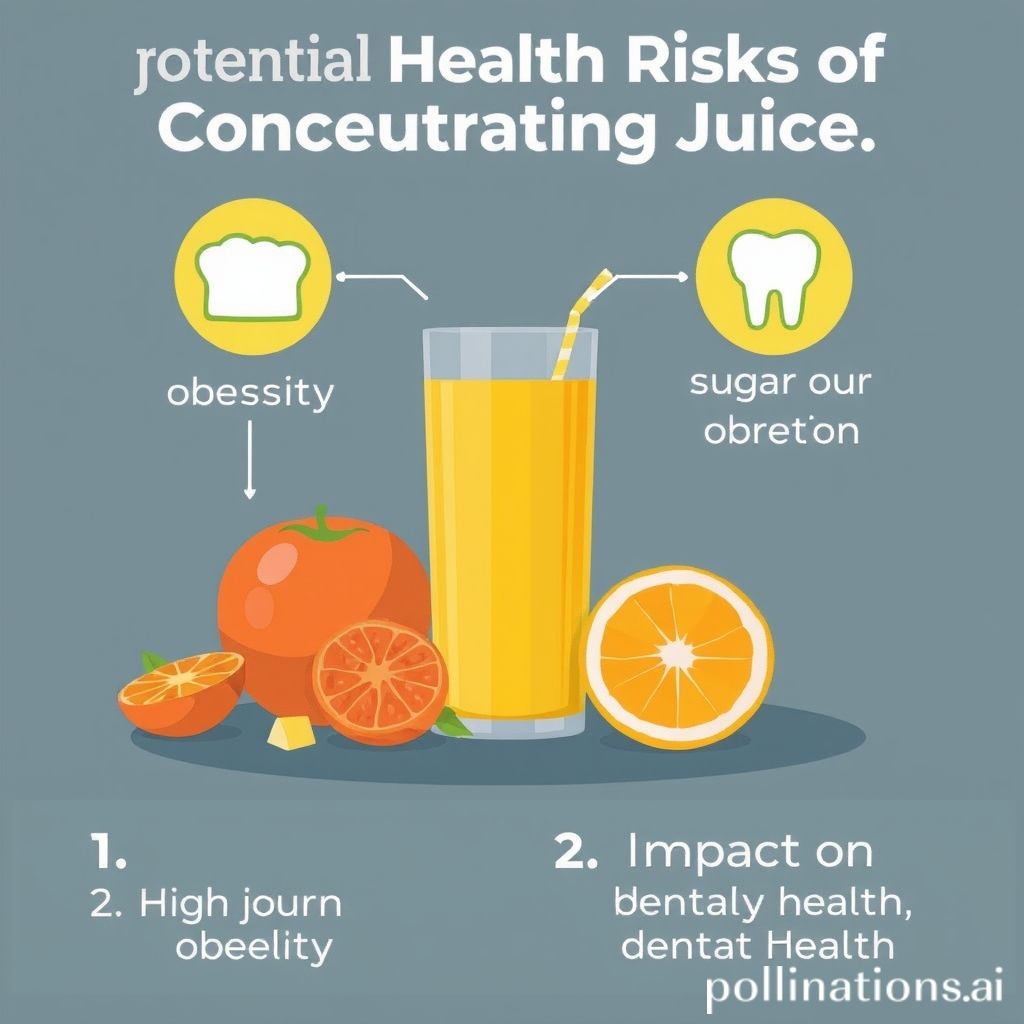Is Concentrated Juice Bad For You?
[su_note note_color=”#fb8e00″ text_color=”#000000″ radius=”12″]It depends on the ingredients and the amount consumed.[/su_note]
Is concentrated juice bad for you? This question looms large in a world where convenience often clashes with health-conscious choices. Concentrated juice, which is typically sold in frozen or liquid form and later reconstituted with water, offers a seemingly quick and easy way to enjoy the flavors of fruits without the need for juicing fresh produce. However, beneath its apparent convenience lies a complex landscape of nutritional considerations.
Concentrated juice has become a staple in many households, finding its place on breakfast tables and in lunchboxes, but its impact on your health is a matter of debate. While it can be a source of essential vitamins and minerals, it also raises concerns related to sugar content, processing methods, and overall nutritional value. To make informed decisions about incorporating concentrated juice into your diet, it’s crucial to delve into the nuances of its composition and potential health effects. In this exploration, we will dissect the pros and cons of concentrated juice consumption to help you navigate the path to a healthier beverage choice.
[su_box title=”
” box_color=”#21db92″]
I. Concentrated juice can be harmful to your health.
II. It lacks essential nutrients and contains added sugars.
III. Opt for fresh, natural juice for a healthier alternative.[/su_box]

Understanding Concentrated Juice
Concentrated juice is a popular beverage choice for many, but knowing how it’s made and what it contains is important for making an informed choice about drinking it.
1. Definition and Production Process
Concentrated juice is made by removing the water from freshly squeezed juice, making it more concentrated. To do this, the juice is heated to evaporate the water, leaving behind a concentrated juice syrup. This syrup can later be mixed with water to make a ready-to-drink juice.
2. Common Ingredients Used
Various fruits, like oranges, apples, grapes, and berries, can be used to make concentrated juice. Despite this, it’s important to note that some commercially available concentrated juices may have added sugars, preservatives, or artificial flavors. Before buying, check the ingredient list to know what you’re consuming.
When consumed in moderation and as part of a balanced diet, concentrated juice can be a refreshing and delicious choice. But too much concentrated juice, especially with added sugars, can lead to extra calories and potential health problems. It’s always best to prioritize whole fruits and freshly squeezed juices for the most nutritional benefits.
[su_highlight background=”#f6b40f”]Expert Tips: Understand concentrated juice. Learn how it’s made, ingredients used, and potential health concerns. Choose whole fruits for optimal nutrition.[/su_highlight]
Nutritional Content of Concentrated Juice
Discover the nutritional content of concentrated juice – a must-know for health-conscious individuals. This article delves into the sugar content and its effects, as well as the preservation of vital vitamins and minerals.
1. Sugar Content and Its Effects
One of the primary concerns regarding concentrated juice is its sugar content. Concentrated juice often contains high levels of added sugars, which can have detrimental effects on health. Excessive sugar consumption can lead to weight gain, an increased risk of chronic diseases like diabetes and heart disease, as well as dental issues.
Key Points:
- Concentrated juice may contain high levels of added sugars.
- Consuming excessive sugar can cause weight gain and an increased risk of chronic diseases.
- Moderation is crucial to maintaining a healthy lifestyle.
2. Preservation of Vitamins and Minerals
At the same time concentrated juice may have its drawbacks in terms of sugar content, it also offers benefits in preserving essential vitamins and minerals. The concentration process involves removing water from the juice, which helps retain the nutrient content. Therefore, concentrated juice can provide a concentrated source of certain vitamins and minerals, making it beneficial for individuals with specific dietary needs.
Key Points:
- Concentrated juice retains a higher concentration of vitamins and minerals due to the removal of water.
- Individuals with specific dietary needs can benefit from the concentrated nutrient content.
- Moderation is key to balancing the benefits and drawbacks of concentrated juice.
This article offers valuable insights into the nutritional aspects of concentrated juice, focusing on the sugar content and effects, as well as the preservation of vitamins and minerals. By understanding these factors, individuals can make informed choices about incorporating concentrated juice into their diet.
| Key Points: |
|---|
| Concentrated juice may contain high levels of added sugars. |
| Consuming excessive sugar can cause weight gain and an increased risk of chronic diseases. |
| Moderation is crucial to maintaining a healthy lifestyle. |
| Concentrated juice retains a higher concentration of vitamins and minerals due to the removal of water. |
| Individuals with specific dietary needs can benefit from the concentrated nutrient content. |
| Moderation is key to balancing the benefits and drawbacks of concentrated juice. |
Potential Health Dangers of Consuming Concentrated Juice
1. Excessive Sugar Intake and Obesity
Drinking concentrated juice can result in consuming too much sugar, which can contribute to obesity. Concentrated juice often contains added sugars, which can significantly increase the overall sugar content. Regularly consuming high-sugar beverages like concentrated juice can lead to weight gain and other health problems associated with obesity.
2. Impact on Dental Health
Consuming concentrated juice can have a negative impact on dental health. The high sugar content in concentrated juice can encourage the growth of harmful bacteria in the mouth, leading to tooth decay and cavities. It is important to practice proper oral hygiene and limit the consumption of concentrated juice to protect dental health.

Advantages of Consuming Concentrated Juice in Moderation
1. Ease and Accessibility
Concentrated juice offers a convenient and easily accessible option for those seeking a quick and effortless way to savor the delightful taste of fruit juice. With concentrated juice, there’s no need to exert effort by squeezing or straining fruits, saving you time and energy.
2. Nutritional Benefits
At that juncture are debates regarding the nutritional value of concentrated juice, it does contain essential vitamins and minerals found in fruits. These nutrients can enhance your immune system and promote overall well-being.
Nonetheless, it’s important to note that concentrated juice should be consumed in moderation. Drinking excessive amounts of concentrated juice may result in excessive sugar consumption, which can contribute to weight gain and other health concerns.
When incorporating concentrated juice into your diet, it’s crucial to consider your overall nutritional intake. Ensure that you balance it with a variety of fresh fruits and vegetables to guarantee a diverse range of nutrients.
[su_note note_color=”#ea2e0c” text_color=”#ffffff” radius=”8″]Extra Tip: “Enjoy the convenience and nutrition of concentrated juice, but remember to consume it in moderation to maintain a balanced diet.”[/su_note]
Is Concentrated Juice Unhealthy?
As for concentrated juice, whether it is unhealthy or not depends on the ingredients and the amount consumed. Concentrated juice is made by removing water from the fruit, resulting in a condensed form of the juice. This process can lead to a higher concentration of sugars and calories per serving.
1. Reading Labels and Avoiding Added Sugars
When selecting concentrated juice, it is important to carefully read the labels. Look for options that do not contain any added sugars. Added sugars can contribute to weight gain and increase the risk of conditions such as diabetes and heart disease. Choosing concentrated juice without added sugars can help you make a healthier choice.
2. Diluting Concentrated Juice for Lower Sugar Intake
To reduce the sugar content in concentrated juice, consider diluting it with water. This not only lowers the sugar intake but also increases hydration. Start by mixing equal parts of concentrated juice and water, and adjust the ratio according to your taste preference. Diluting concentrated juice can be a simple yet effective way to enjoy the flavor At the same time reducing the overall sugar content.
Conclusion
Concentrated juice can have negative effects on your health if consumed in large amounts or if it contains added sugars and preservatives. During it may provide convenience and a longer shelf life, it is important to consider the nutritional value of the juice.
Opting for freshly squeezed or 100% fruit juice can be a healthier choice as it retains more nutrients and does not contain added sugars. Moderation is key In regard to consuming concentrated juice, and incorporating a variety of whole fruits into your diet is always recommended for optimal health.
Faq about Concentrated Juice: Frequently Asked Questions
FAQ 1: Is concentrated juice the same as fresh juice?
No, concentrated juice is not the same as fresh juice. Concentrated juice is made by removing water from fresh juice, resulting in a more concentrated flavor.
FAQ 2: Can concentrated juice be a part of a healthy diet?
Yes, concentrated juice can be a part of a healthy diet when consumed in moderation. Conversely, it is important to note that concentrated juice often contains added sugars and fewer nutrients compared to fresh juice.
FAQ 3: How much concentrated juice is safe to consume?
The recommended amount of concentrated juice to consume varies depending on an individual’s age, health, and dietary needs. It is best to consult with a healthcare professional or nutritionist to determine the appropriate amount for you.
FAQ 4: Can concentrated juice be given to children?
Whilst concentrated juice can be given to children, it is important to limit their intake due to the high sugar content. It is recommended to offer whole fruits or diluted fresh juice as healthier alternatives for children.
FAQ 5: Are there any alternatives to concentrated juice?
Yes, there are several alternatives to concentrated juice. Some options include drinking fresh juice, consuming whole fruits, infusing water with fruits or herbs, or opting for unsweetened beverages such as water or herbal tea.
Please note that the information provided is for general informational purposes only and should not be considered as medical advice. It is always recommended to consult with a healthcare professional or nutritionist for personalized guidance.
